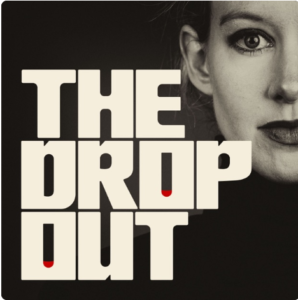Part 3 of a #ReadWithMe Series
Read the earlier posts here and here.

By 2016, Holmes and Balwani had broken up, and he was leaving the company. Carreyrou’s series of articles about Theranos’s unreliable technology had been published in the Wall Street Journal. And yet, many of Elizabeth’s early investors, like Tim Draper, still defended her unreservedly as someone who is “doing a great thing for humanity” and “changing healthcare as we know it.” Channing Robertson, her early supporter at Stanford, also remained a strong supporter, though the podcast notes that there may be pecuniary reasons for that, as Robertson was paid about $500,000 annually by Theranos.
In June, 2016, the deal with Walgreens fell apart and Walgreens sued for $140 million. The suit was settled, but more suits seemed to crop up every day. And regulators were now saying that Theranos’s technology was so unreliable it posed an “immediate risk” to patient health and safety. Theranos now came under investigation by the SEC.
The Dropout does an amazing job of highlighting the contrast between Holmes’s confident, in-control, and authoritative demeanor in interviews, with her answers in her deposition to the SEC, where she responded to their questions with “I don’t know” and “I don’t remember” more than 600 times. Again, the podcast lets us hear the shakiness of her answers as she tries to evade and avoid.
There’s enormous satisfaction in this fifth episode of The Dropout. Finally, someone is asking the right questions, and not letting Holmes’s standard answers pass without scrutiny. Finally, we hear Holmes faced with her claims and with the pile of evidence against them. The podcast notes that it seems that for Holmes “There was no distance between aspiration and reality.” Because she wanted the machines to work, she claimed that they did.
It’s a good way to get charged with fraud by the SEC. And that’s exactly what happened. Balwani pled not guilty. Holmes settled. And then the Department of Justice brought criminal charges.
As of now, the trial of Elizabeth Holmes–who pled not guilty to these charges as well–is still pending. It has been rescheduled several times, and on August 12, 2020, the trial date was set for March 9, 2021.
The last half of episode 5 and most of episode 6 of The Dropout are dedicated to trying to humanize Holmes and Balwani. I found this fairly unpersuasive, though I do understand the need to present something like an unbiased account. But details of Balwani’s father’s early death, or Holmes’s struggles as a dedicated but completely unsuccessful high school track athlete seem like so much weak tea in response to the collapse of their claims and their misleading of the public and the medical community for years.
And at the end of The Dropout we are still left without answers to our most important questions. Was Theranos a failure or was it a fraud? Is Elizabeth Holmes an innovator and entrepreneur whose idea just didn’t pan out, or is she a con artist? And how can we ever really know?

Her upcoming court case may give us some answers, but given the many difficulties of establishing intent to defraud in the ever-churning world of startups, I don’t hold out much hope for a definitive answer.
One more iteration of the story of what happened at Theranos, however, did give me a few answers to some other questions I had. Stay tuned for a final, quick post on Tyler Shultz’s podcast, Thicker Than Water.


Comments are closed.